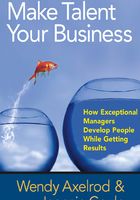
Foreword
DURING A RECENT INTERVIEW, an executive with a large investment firm asked me if the principles regarding talent and people my firm advocated would cause his people to work harder for the same money, so that he could buy a bigger yacht. I was stupefied and not sure how to respond. I realized that leadership Neanderthals continue to exist who worship the escapades of Gordon Gekko, the hero of the Wall Street movies.
Fortunately, fewer and fewer leaders practice traditional command-and-control, greed-is-good, self-interest-rules leadership. More leaders recognize the importance of communicating and coaching, generosity over greed, and service to others more than self-interest. These enlightened leaders understand that business is about people, inside the company and as investors and customers outside the company. Simply stated, when people are at the heart of business, business operates better.
Dave Ulrich is a business professor at the University of Michigan, a partner in the RBL Consulting Group, winner of the Nobels Colloquia Prize for Leadership on Business and Economic Thinking, and the best-selling author of two dozen books on business leadership.
But while pledging that “people are our most important asset” is easy to say, it is not always easy to do. Wendy Axelrod and Jeannie Coyle insightfully, wisely, and clearly close the knowing-versus-doing gap. They are uniquely qualified to help modern leaders become exceptional development managers (EDMs) who create exceptional developing employees (EDEs). They have combined decades of personal experience in identifying and developing leaders, they are informed consumers of theory and research, and they have thoughtfully interviewed EDMs and EDEs to find out how to “make talent your business.” I have known them for many years and knew of their passion for developing people while getting results. What I learned by reading their book was how clearly and cleverly they can turn complex ideas into doable actions. Their book shares stories of real managers who have learned how to develop people and then translates these cases into practical principles.
The result of their experience and work are five practices that will help any manager turn the rhetoric of talent management into the reality of competent and committed people.
As I savored their insights, I was reminded of a set of Russian matryoshka (nesting) dolls, in which the doll hidden inside each larger doll shows increasing detail and craftsmanship. The five practices Wendy and Jeannie propose are only the outer image of the further refinements they offer for helping leaders better develop and manage their people. As a result, their book became increasingly richer and more fulfilling the more I delved into each chapter. Leaders who understand the principles and access the practices the authors offer will recognize the pathway to becoming an EDM.
Managers who make every day a development day will discover that development is not a sidebar to work but work itself. Our research has revealed that top companies for leadership had managers who spent about 25 to 30 percent of their time on developing future leaders. Sometimes when we present this finding, leaders gawk and wonder how that is possible with the press of business. Wendy and Jeannie offer very concrete examples of how leaders develop others every day and every way.
When managers tap into the psychological side of development, not only do they look in the personal mirror that reflects their own behavior, but they also try to understand why employees do what they do. We have found in our research that when employees have a why to work, the what and the how of work are much easier to accomplish.
Leading others is a team sport as evidenced in the principle of connecting people with development partners. Partners may be friends, colleagues, or social media associates. These partners offer support and build peer pressure to help people develop.
Organizations don’t think; people do—and when people think and act, there are inevitably political and relationship overtones. Managers who develop people master the practice and teach skills to navigate the political terrain. As managers help others recognize and engage in the positive aspects of political discourse, they help people learn to make things happen.
Finally, managers who develop people shape their environment to drive development. We have found in our work that when leaders are meaning makers, employees are not only competent and committed but also fully contributing with their heart and soul. Creating an organization where this sense of purpose is abundantly instilled in all employees becomes a primary leadership agenda.
As each of these five practices is assessed and accessed, leaders can become development managers. What is particularly impactful is how these five practices overlap and build on each other. The truly exceptional leaders of the future will not only understand but put these practices into action.
Of course, like the tradition-bound leader who interviewed me and was more concerned about self-interest than service to others, not all leaders will be able to lead the employees of the future. But with help from outstanding books like this one, leaders who want to lead exceptional employees will be more able to do so. And leaders who rely on historically autocratic approaches to leadership will find themselves increasingly isolated from both people who care and from business results that matter.
Thanks, Wendy and Jeannie, for this marvelous treatise and guide on becoming exceptional development managers.